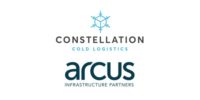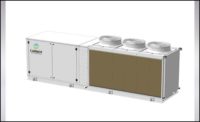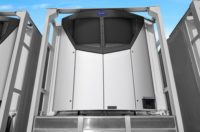DSI Freezing Acquires Belgium-Based Cryogenic Equipment and Services, and Denmark-Based Dantech Freezing Systems

DSI Freezing Solutions A/S, a Denmark-based market leader in plate freezing technology, has acquired Cryogenic Equipment and Services NV (CES) and Dantech Freezing Systems A/S (Dantech). Thereby it has created a new global player with the industry’s widest product range within industrial freezing, cooling, and heat treatment of food.
“With these two strategic acquisitions, we’ve become the only global player that can offer the food industry the full range of freezing technology as well as a broad choice of solutions for cooling and heat treatment of food,” says Lars Priess, CEO of DSI Freezing Solutions A/S.
DSI Freezing Solutions A/S (DSI) has expanded its portfolio with the acquisition of the Belgian company CES, an expert in cryogenic freezing, as well as Dantech, which is among the world leaders in mechanical freezing technology, especially spiral and tunnel freezers. As a result, DSI is now the only global supplier of all three types of freezing technology – creating significant synergies for both existing and future customers.
Three companies become one
Since DSI was acquired in 2017 by Procuritas Capital Investors – a Nordic private equity fund – the company has worked purposefully to build a strong platform for securing future growth. Partly through the acquisition of its long-standing partner Erlinord, which handles the automated part of the plate freezing process, and partly through massive investments in production, sales organisation, test facilities, R&D and IT. Today, DSI is present in Denmark, Korea, Singapore, Russia, and the United States.
CES was established in 1989 by Karel Vanackere and has since developed into one of the largest independent suppliers of cryogenic freezing technology in the world. The company is headquartered in Belgium and from there supplies equipment mainly to the food industry, but also to the pharmaceutical and metal industries. In the United States, it mainly produces equipment for the food industry.
Hans Vanackere, who is now handing the company over and stepping away from his role as CEO, says: “It was important for us to find a partner with a leading position, in-depth knowledge of the industry, focus on quality and customers, and a strong vision for the future development of CES.”
Dantech was founded in 2017 and until the takeover was owned by Henrik Ziegler and Carsten Bak Andreasen. The company is the result of a merger between Dantech Freezing Systems Pte. Ltd. and Innosteel A/S. The company has more than 30 years of experience providing freezing solutions to the food industry. It has grown rapidly, especially in recent years, and today is a leading global player in mechanical freezing, including spiral and tunnel freezers, as well as spiral ovens. Dantech is headquartered in Aalborg and has branches in the US, Singapore, Mexico, Russia, Poland, and Germany.
Henrik Ziegler states: “We were looking for a partner to boost and support our future growth,” and Carsten Bak Andreasen adds: “It was also important for us to ensure that the buyer would continue to focus on creating future opportunities for the employees based on the company’s growth.”
Henrik Ziegler will continue to be involved in the management of the new, larger company.
With the acquisition of the two companies, an international player in food technology has emerged, and Denmark’s position as a leading nation within food technology has been further consolidated.
High expectations for the future
Despite the Covid-19 pandemic, DSI Freezing Solutions A/S achieved a top-line growth of +5% and a bottom-line growth of +10% in 2020, and expectations for the coming years are high.
“With our new setup and a total of around 300 employees, we expect a turnover of more than DKK 500 million in 2021,” says Lars Priess, adding: “We look forward to getting even closer to our customers thanks to our strong production and service setup in Europe, the US and Asia. About half of our customers use several different types of freezing technology, which they can now get from a single supplier.”
The three freezing technologies (plate, cryogenic and mechanical) complement each other well and cover both high- and low-volume production as well as IQF, block and bulk freezing. In addition, the technologies cover virtually the entire spectrum of foods, from meat, fish, and poultry (including by-products) to fruit, vegetables, and ready meals. And the three companies already share a passion for quality and reducing their environmental impact. All three organizations are increasingly looking at environmentally friendly alternatives that can make a difference both to future generations and to the existing customers’ business cases, for example in the form of reduced consumption of energy, chemicals, and water.
Thus, the global food industry is now presented with the perfect match in terms of both technology and value, with all the benefits this entails in the form of geographical presence, concentrated expertise, customer focus and sustainability.
Looking for a reprint of this article?
From high-res PDFs to custom plaques, order your copy today!





